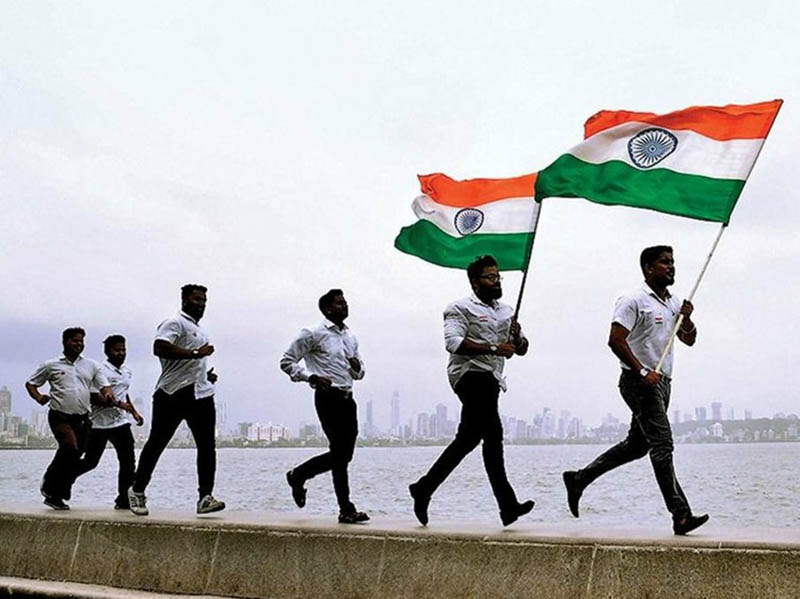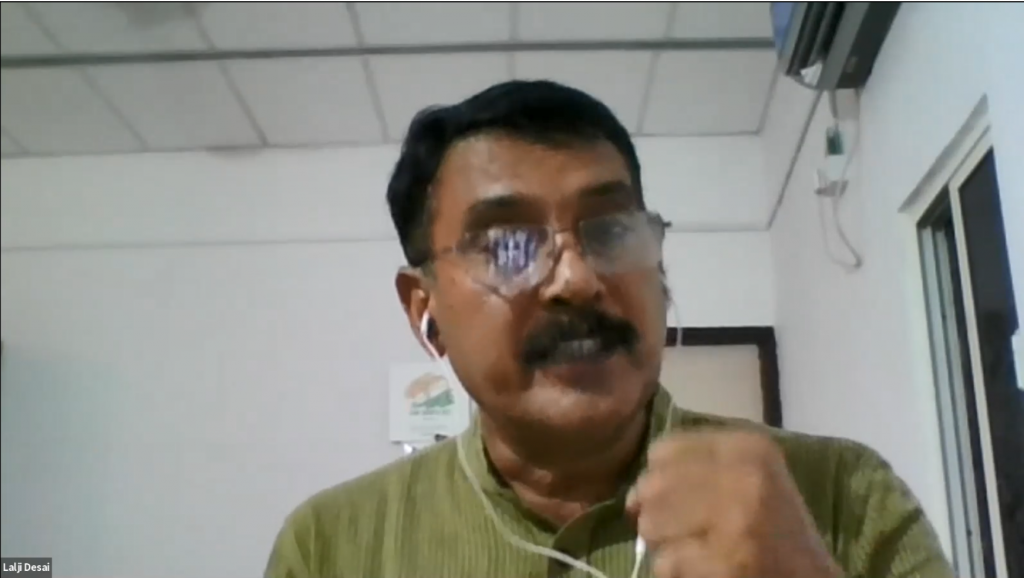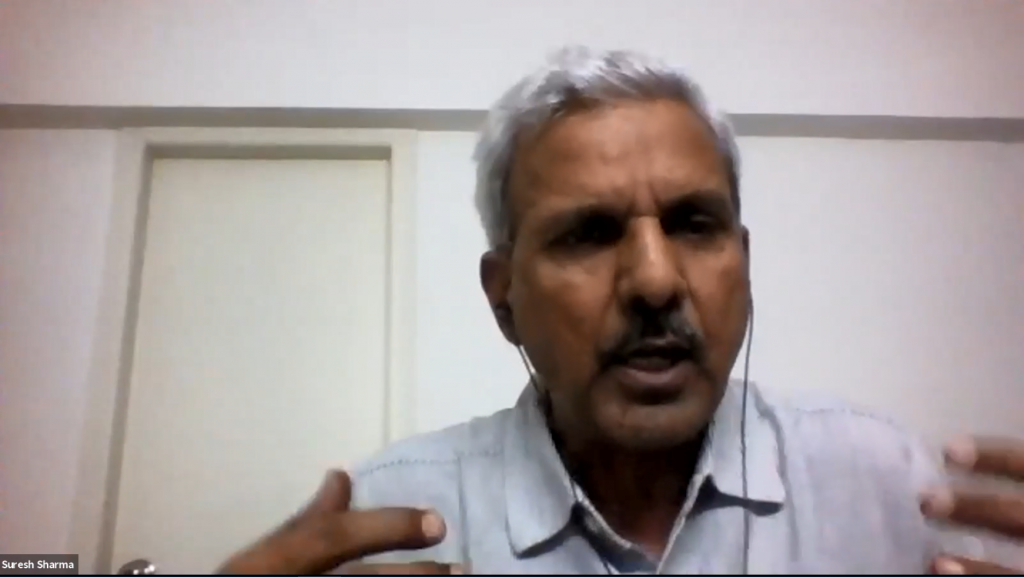Transcribed by Susheelkumar S Hallur
Congress Seva Dal Web Discussion
Featuring Lalji Desai and Prof Suresh Sharma
on August 16, 2020
Introduction
AIPC Karnataka organized its second webinar in its #ProfessionalsSpeak series on 16th August 2020.
This session was a conversation between Lalji Desai (Chief organizer, All India Congress Sevadal) and Prof. Suresh Sharma (Former Joint Director, Jawaharlal Nehru Leadership Institute). It was organized as a Master Class on Ideology of Indian National Congress and was an attempt to answer the question – What we stand for in comparison with other Ideologies?
The Master class was Titled – “Nationalism or Patriotism: The crucial difference“.
The webinar was organized into four segments
i. Opening Remarks by Vikram Kaushik and Varughese Cherian from AIPC
ii. Conversation between Lalji Desai and Prof. Suresh Sharma
iii. Question and Answer Session
iv. Closing Remarks and Vote of thanks from Dipali Sikand from AIPC
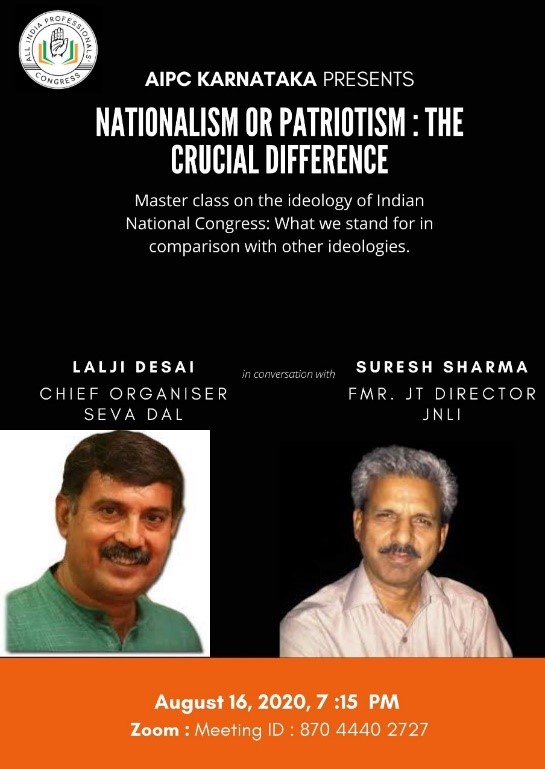
i) Opening Remarks
The session started with Varughase Cherian introducing Lalji Desai and Prof. Suresh Sharma to the Audience. Then, Vikram Kaushik welcomed both the speakers and thanked them for coming here to tell us more about the India that we all believe in.
ii) Conversation between Shri Lalji Desai and Shri Suresh Sharma
The conversation was started by Lalji Desai. First, he thanked the 200 odd people who were attending the webinar for taking their time out to come and attend the webinar. He told that there are very few people like the audience today. But each person in the audience is like a spark and the spark holds the seed of a big fire.
Lalji Desai then began the session with a story. It was a story of two cities of Greece – Athens and Sparta.
The story was set 2500 years ago in ancient history when these two cities were experimenting with different ways to rule a country. Athens experimented with Democracy. Athens tried to rule the city on the principles of Freedom, Human rights, encouragement of intellectuals, development of individual, and decentralization of power. Sparta on the other hand experimented with Nationalism. Sparta tried to rule the city on the principles of Discipline, Military training, Centralization of power, Nation as defined by its boundaries and a superiority complex in their way of thinking. Due to this different way of functioning very soon, a war erupted between Athens and Sparta. Athens lost. After Athens lost the war, Socrates who was the key proponent of the democratic way of ruling was put on Trial. The Trial concluded by sentencing Socrates to death using the same Laws he had helped to establish. However, he was told that if he confessed that the Idea of democracy was wrong – he could be pardoned. Socrates told he was ready to go to the gallows instead of making such a confession. Plato who was observing all this, went to Socrates and asked – Why did you not denounce the democratic methods that were responsible for handing you a Death sentence? Socrates replied by saying – The Law maybe wrong, but the method used to arrive at the law is correct. He further added that if the method is correct and the laws are wrong – over time, the wrong laws will be corrected.
After telling us why democracy and its methods are very important by means of a story, Shri Lalji Desai explained the characteristics of Nationalist thinking in more detail. He told us that nationalistic thinking wants a small group of people to wield the maximum power. They believe that this centralization of power will help them to have control. They try to keep the people in fear. They do this so that people will think that only the nationalists have an answer to all the threats. They use a combination fear and control to keep coming back to power.
However, he warned us that this is not right way. People following blind nationalism usually get addicted to power. This addiction when uncontrolled breeds anger, jealousy, and superiority complex. This superiority complex then leads them to think that their way is the only right way and anyone else not agreeing with them need to be finished. This Nationalist power structure also leads to other problems like casteism and Religious fascism. These problems then become the reason for Nationalist’s defeat. To prove this point he gave examples of how the life and rule of Nationalist leaders like Hitler and Mussolini ended.
Lalji Desai then compared Nationalist way of thinking with the democratic way thinking. He explained that in the democratic way of working decentralization of power is encouraged. It allows people to have different opinions. When people have any difference of opinion each person listens to the other and a dialogue ensues. Based on the outcome of these dialogues’ decisions are taken.
Having compared the Nationalist way of working with Democratic way of working, Desaiji explained that the follower of Nationalistic Ideology is a blind follower. He simply acts without thinking when asked by the central controlling power. The follower of a Democratic way of thinking is a very aware and a broad thinker. He thinks in terms of whole humanity and the good of all people involved. Follower of Democracy in its right sense is Patriot. He further elucidated that that looking at Patriotism from the view of national boundary is incorrect. Doing such a thing, he said creates an environment of competition and one up Manship between nations. He then urged us not to think about Patriotism in terms of geographical boundaries but instead to think of patriotism as an affiliation to Humanity. As a true patriot, he asked us to look at the entire world as one family whose fate are interconnected and interrelated. Having said this, he then handed over to Shri Suresh Sharma.
Prof. Suresh Sharma then continued by reiterating that the key characteristics of Nationalist ideology are – Arrogance, controlling everyone and everything and creating an environment of fear. He then said that the basic difference between Nationalism and Patriotism is the presence of a feeling of Sacrifice. This feeling of sacrifice for others is the driving force for Patriotism and is completely absent in Nationalism.
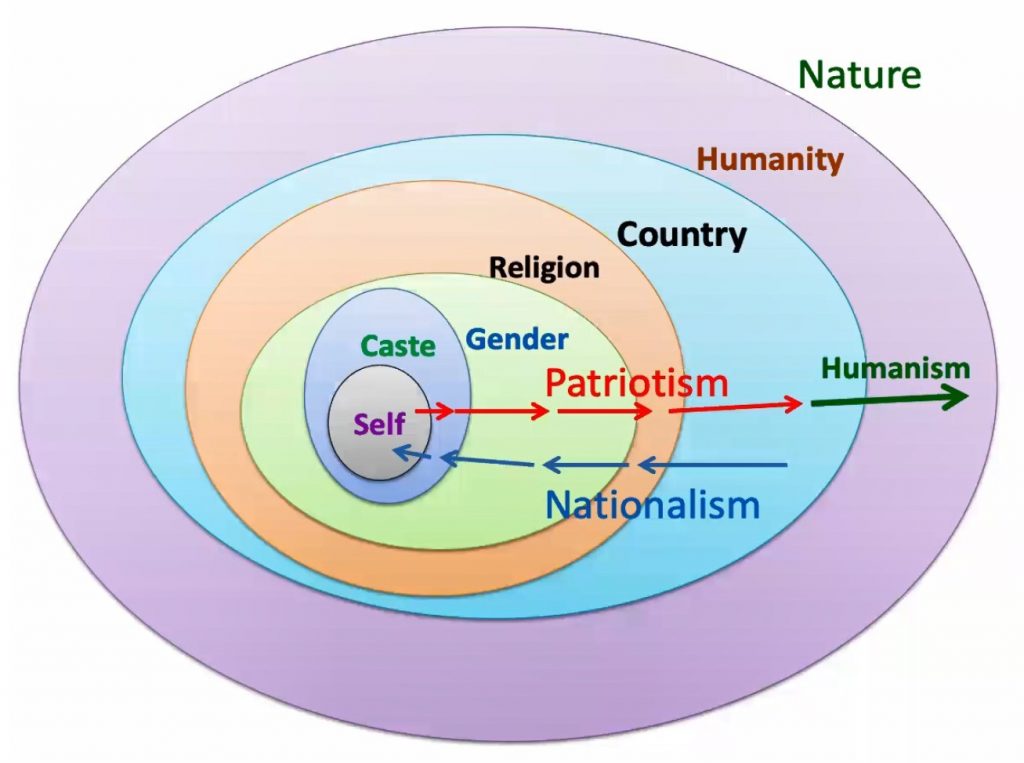
Shri Suresh Sharma then ventured to explain to us the difference between Nationalism and patriotism in a conceptual framework. He explained to us that the journey of Nationalism is inward. Their journey starts from the outside and ends with ME. The journey of nationalism looks something like this
Country –> Religion –> Caste –> Gender –> Region –> Family –> ME
He said that this Journey of a nationalist is primarily driven by selfishness, Negative energy, Hate and Jealousy.
Shri Suresh Sharma further explained that as compared to the above, the Journey of a Patriot starts from ME and ends with becoming one with Nature. It is an outward journey. The journey of a Patriot looks something like this
ME –> Cast –> Gender –> Religion –> Country –> Humanity –> Nature
If you notice, the Journey of a Patriot is diametrically opposite to that of a Nationalist. Patriots thinks about National integration. They see everything as one interconnected unit and hence respect everyone. They believe in their rights and at the same time hold an opinion that other people and countries too have equal rights. When they listen to people of other faith or religion or country they do so with respect and accept their positive points. To make the meaning of a patriot clearer he gave us the example of the Protocol followed in Military. He told that after fierce battle between two armies when a soldier is killed the winning soldier salutes the dead soldier as per Military Rank. The winning Soldier salutes the dead solider because he knows that, just like him, the person who is now dead is a Patriot. He knows that the Soldier died protecting his country. A true soldier will not humiliate or show jealousy towards the dead enemy. This is exactly how a patriot too behaves, he said.
Shri Suresh Sharma then proceeded to explain Patriotism from a Nehruvian point of View. He said that half a sentence of what Nehru told is enough to put to rest the difference between a Patriot and a Nationalist. That sentence of Nehru is – Bharat Mata is essentially its people. So, when Patriots talk about Bharat Mata, they are talking about all its people irrespective of who they are how they came here. As opposed to this the Bharat Mata that Nationalists talk about is defined by its India’s geographical boundary. They will never accept Bharat mata as consisting of its people. If they do so, they will also have to accept that a Dalit or a Muslim is as much part of Bharat Mata as a Hindu is. Doing so, will mean deviating from the core Ideology that Nationalist like RSS/BJP hold. He further asked us to note that by this definition of identifying Bharat Mata by its boundaries that BJP/RSS hold will also mean that they accept Bharat mata came into existence only from 1947. Before that, todays India was nothing but an amalgamation of Princely states.
Shri Lalji Desai then picked up the example of Bharat Mata to further explain the differences between Nationalism and Patriotism. He asked us to note that a Nationalist’s Bharat Mata has a Bhagwa, a Trident and a Tiger. The Symbolic meaning of Bharat Mata holding Bhagwa signifies that only one color will work in India and that is Bhagwa. It further signifies that only one way of thinking is allowed, which is their way of thinking. The symbolic meaning of Bharat Mata holding a Trident and riding a tiger signifies that they are ready to resort to violence to achieve their goals.
As compared to this the Bharat Mata of a Patriot holds our Tri color flag. This signifies that a Patriot is driven by inclusiveness, sacrifice, love, Patience and a desire to make a positive impact in Nation building. This also signifies that while the Patriots believe that they have full right to develop their own country, they also believe that other nations too have such an equal right. Finally, a patriot’s depiction of Bharat Mata signifies that a Patriot is concerned and sensitive towards the underprivileged and the last person in the line. They want even these people to feel included and free.
Shri Suresh Sharma then turned our attention to the constitution of India. He pointed out that our constitution which was framed by true patriots is based on four pillars – Justice, freedom, brotherhood and equality. He reminded us that Nationalist parties like RSS did not want the constitution to have these four principles as it pillars.
The Nationalist parties like RSS wanted to base the Constitution on Manu smriti, they even actively tried to campaign to make this happen. The reason why Nationalist parties preferred Manu smriti was because it had religion and cast as its pillar, which would further allow them to have control over the society.
Shri Suresh Sharma then explained us more about the desire of Nationalist parties like RSS/BJP to have complete control. He said this desire for control can be seen clearly in the newly proposed education policy. He explained that the new education policy is designed in such a way that poor people will lose their right to education over time. This would mean that only the well-off can afford to stay educated. The reason nationalist does not want the poor to be educated is because once educated they will start asking for a Job. Then a salary, and perhaps an increment. All these things will make the nationalist lose their control over these people. In fact, he even reminded us what Shri Piyush Goyal recently told that unemployment is good for the economy! He further added that this desire for control makes the nationalist parties to allow few businessmen to monopolize everything. The Idea behind facilitating this monopolization is that all small business will work for few businessmen making it easier for the nationalists to control everything.
In the end Shri Suresh Sharma told that if we consider all citizens to mean India, then we are a patriot. If we look at citizens from the prism of Religion, cast, Region etc. then we are a Nationalist.
He even went further and remembered Rabindranath Tagore who said that his guiding light in life is not patriotism but Humanism. He in fact reminded that Rabindranath Tagore said that if humanism is diamond, then Patriotism is glass. Shri Suresh Sharma than told us that it is very easy for a Patriot to become a Humanitarian. It was just like taking one more step in the direction in which a patriot is already travelling. However, a Nationalist can never become a Humanitarian because his journey itself is in the opposite direction.
In Conclusion both the speakers reminded us that Patriotism is our attitude towards our Nation. They asked us to look at the below chart and then ask ourselves in which direction we are going. The answer to this question will then help us to clearly understand the difference between a Nationalist and a Patriot. The answer will also help us take a decision on what we want to be – A nationalist or a Patriot.
With these concluding remark we moved to the Question and answer session.
iii) Question and Answer session
a. A Participant asked – Why are the Right wingers always targeting Jawahar Lal Nehru?
Shri Suresh Sharma and Shri Lalji Desai both felt that this is mainly because of the Idea of Patriotism that Nehru propagated. The message of Nehru is as expansive as humanity itself. Nehru did not talk about only one cast like BSP. He did not talk about two casts like SP. He did not even talk about one state like regional parties. What Nehru instead spoke about was the whole of India. This thinking directly attacks the RSS/BJP thinking and hence their desire to destroy the legacy of Nehru. And to destroy a Legacy these nationalist parties’ resort to character assassination.
Sevak Milind asked: How do we prevent majoritarianism from overpowering individual values in a Democracy. Is doing so an Anti-thesis to a democracy?
Both the speakers noted that majoritarianism annihilating Individual values was anticipated as early as 1947.It is just that this is now coming to pass. They also feared that this will increase in coming years. The speakers said that the only way to avoid this is by resisting these forces. These forces can be resisted by educating people, warning people of the impending danger and by not stopping the fight for justice. We should also tell people about our alternative plan and how it is helpful. We should tell people the difference between Patriotism and Nationalism so that their fear is replaced by courage. We should sensitize people what damage unbridled majoritarianism rule can do as compared to a collective rule. Last but not the least, the speakers said that we will lose the moment we start fearing. We should keep fighting and never loose courage.
b. Arthanari Eswaran asked – Some educated people think that one party rule or strong man politics is helpful for a country like India. How do you counter this?
Shri Lalji Desai answered this by telling us about different models of development. He informed us that there are two models of Development – Participatory model and Cost efficiency model. The Cost efficiency model has less spending and gives faster results. This is the approach usually taken by Authoritarian and military powers. People preferring this model of development fail to notice what we lose at the expense of faster results. These people should note that the best of cost efficiency model is when there is only one-man policy, no elections, no panchayat and allowing everything to be run by military. This approach is the fastest and highly cost efficient. After remembering this, people should rethink – will a development made in this way be led to what we aspire for our country?
c. Another Participant asked – Nowadays people are rejecting original Congress/Gandhian Ideology? How to revive and communicate it correctly to the people?
Both of speakers believed it is a strategically spread myth that people are rejecting the congress and Gandhian Ideology. They reiterated that not getting votes does not amount to rejection of congress ideology. They asked us to remember that congress as a party is still alive after 136 years of ups and downs. They also told us that the depth and clarity of the congress ideology is so good that it can also be superimposed on the constitution of India. Hence, it is an Ideology that is naturally accepted in India. As compared to this the BRJ/RSS Ideology is that of majoritarianism and dividing people on cast lines. This Ideology may seem very unnatural to many Indians. They felt that people preferring Nationalist Ideology is just a phase and it will change when people notice it hollowness. They further added that it is always easier to unite people with hate and difficult to unite people for a creative work. Since congress ideology is a creative journey from inside to outside as explained above it is not easy to follow. This also makes it more difficult to communicate Congress’s core Ideology.
d. A participant wanted to know what work does Sevadal do for Nation development? What role can youngsters play in Seva Dal? Is there an easy way to join Seva Dal?
Lalji Desai answered to this question stating that Sevadal was initially formed by youngsters during our freedom struggle. However, after winning the freedom struggle, Sevadal became a bit complacent. RSS borrowed the grass root features of the Sevadal and taking advantage of absence of Sevadal volunteers on ground spread the RSS Ideology. However, he was happy to inform that now Shri Rahul Gandhi has understood the important role of Sevadal. Shri Rahul Gandhi believes that if the nation must be strong, congress must be strong. And if Congress must be strong Sevadal has to be strong. With the help of Shri Rahul Gandhi Sevadal is being revived again. All obstacles to its growth are being systematically removed. Due to this youngster are again joining Sevadal. with the help of these youngsters Sevadal now plans to focus on social service and nation building. To facilitate this, Sevadal will strengthen the organization and develop the leadership skills of the people joining them. Finally, he told us that several steps are underway to further encourage the growth of Sevadal. These steps include flagging off Mission 10 million, starting the Join Sevadal campaign and developing applications that will help people to join Sevadal digitally.
e. One another participant wanted to know why the RSS was able to grown so fast off late and how can this be stopped?
Shri Suresh Sharma answered this by saying that it is the nature of Right-wing parties to grab more power when they are already in power. RSS is finding the people who Voted for BJP due to various reasons and asking them to join their shakas. This is making us think that RSS is growing at a very fast phase. However, he believed that this phenomenon will be short lived. People will leave RSS/BJP as soon as Modi becomes unpopular and vacates power. The only sad news is that it will take some time to remove the poison that the right-wing parties have spread when they were in power. The only way to counter this is by strengthening our organization and being with people.
f. One member of the audience commented that it Looks like India is ruled by Religion. However, the Congress has got a tag of being a Minority appeasement party. So how should this be handled ?
To this Prof Suresh Sharma answered that it is in the DNA of Congress to fight for the underprivileged and the last person in the line. He felt that this is not appeasement but a core value that Congress brings to the table. Both the speakers believed that this kind of thinking is essential for Nation building in the truest sense. They strongly felt that we should not fall prey to this narrative and abandon our principles. If we did so, that would be the true victory of the RSS. In conclusion both the speakers felt that RSS/BJP are spreading this narrative because they themselves have no firmness of Ideology and they wish that congress abandon its firm belief in its own Ideology.
iv) Closing remarks and Vote of Thanks
This brought us to the last segment of the webinar which was the Vote of Thanks. Smt. Dipali Sikand thanked both Lalji Desai and Suresh Sharma for the great learning and the wonderful interactions on behalf of everyone in the audience.
Both Shri Lalji Desai and Prof. Suresh Sharma expressed their pleasure for being part of this meeting and thanked the organizing team for inviting them. Shri Lalji Desai said that he would be interested to be part of another session where people not in agreement with his point of view get to speak and he gets an opportunity to address their apprehensions.
The event was then closed by Shri Varughese Cherian thanking all the moderators and the organizing committee for arranging the webinar in such smooth manner.
Disclaimer: This is a transcript of a Web Discussion. The opinions expressed are the personal opinions of the respective speakers. AlignIndia does not take any responsibility for the opinions expressed.


